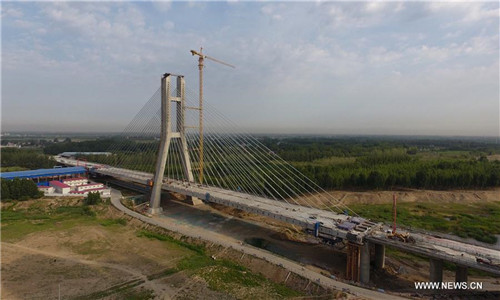HOME >> SOURCE
Congestion at Beijing checkpoints causes commuter frustration
By Zhang Dan and Tu Lei Source:Global Times Published: 2020/3/9 21:36:22

The Chaobaihe Bridge after closure which links Tongzhou District of Beijing with Yanjiao Town of north China's Hebei. Photo: Xinhua
As more companies in Beijing resume work, several checkpoints in Beijing bordering North China's Hebei Province have seen serious congestion.
A video showing crowds and heavy traffic congestion at a checkpoint in suburban Beijing was widely shared online on Monday, causing netizens' concern and complaints about the slow health checks and crowds for people living in Hebei to resume work in Beijing amid the coronavirus outbreak.
In the video forwarded by China Newsweek on China's social media Weibo, large number of people wearing masks, riding motorbikes and driving vehicles gathered at congested checkpoints and waited for temperature screening - a mandatory step to enter Beijing amid the coronavirus outbreak.
The average passing time for vehicles on Jingqin Expressway was about two hours, according to the video.
Baimiao checkpoint in southeastern Beijing's Tongzhou district is a must-pass for many people working in Beijing but living in Yanjiao. The city is in Beijing's neighboring area in Langfang, Hebei - only 30 kilometers away from Beijing.
Chen Lixin spent nearly four hours to get to her office on Monday morning, nearly four times the usual. She told the Global Times that she left home at about 8:30 am and arrived at the office after noon, a 15-kilometer distance that she used to cover in about one hour before the virus outbreak.
"I returned to work on March 1, and at the first, the traffic was not that congested, but four or five days later, I found the roads become more crowded," she said. "I have to work for a living, but it is just too hard… and I do not know how long it will last," she said.
Chen's words were echoed by another driver surnamed Luo who passed the Baimiao checkpoint on Monday morning.
"We need to get out of the car, swipe our ID cards, measure our temperature, and roll down the window for the police to make a full check," he told the Global Times.
Spending three hours on the way to work, Luo said his commute between Yanjiao and Beijing amid the coronavirus was too tiring.
An assistant police officer at a checkpoint in suburban Beijing's Shunyi district told the Global Times that officers spend at least three minutes on the examination for one vehicle.
All the people in the car must get out the vehicle to accept checks and take temperature measurements, he said.
"It is obvious traffic jams appeared in recent days as many companies in Beijing resumed work," he noted, adding the cars couldn't do anything but wait.
The congestion caused dissatisfaction among netizens on social media. A WeChat user called "Lifeng" commented that "Are the checks which resulted in mass crowds really good for epidemic prevention and control? If there was an infected patient who didn't show any symptoms among the crowds, all the people might get infected."
Other netizens also noted the risks caused by crowding at checkpoints is probably higher than that of identifying coronavirus-infected people.
The regular checks have brought unbearable pressure at checkpoints in Beijing, hence, emergency urban governance adjustments should be made, experts said.
They also advised Beijing authorities to include people living in Yanjiao and other boundary areas in Hebei within Beijing's epidemic prevention and control system, such as issuing fast passes to the group to avoid huge crowds at checkpoints and possible infections, because of the large number of commuters between the two cities.
RELATED ARTICLES:
Posted in: ECONOMY